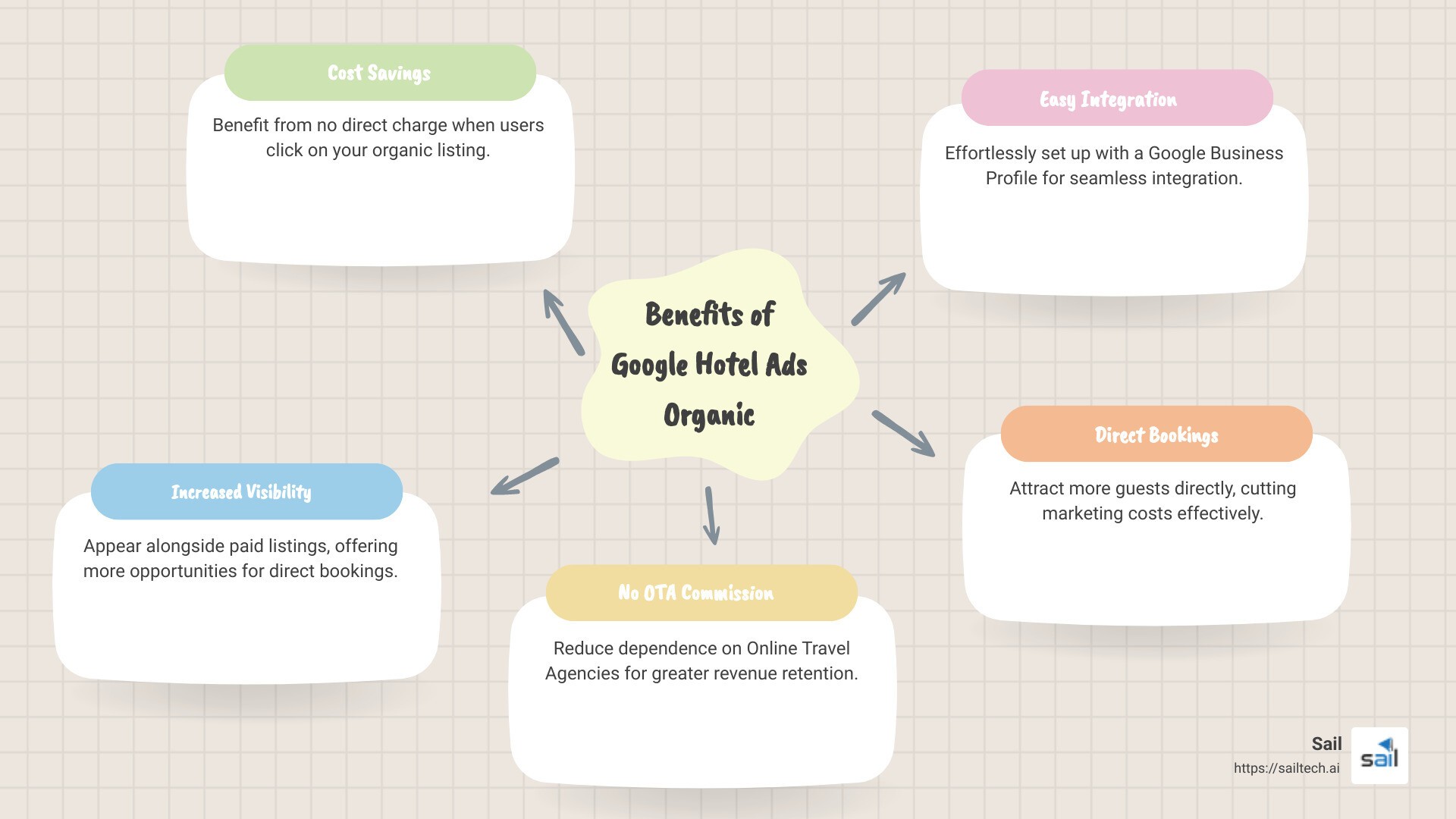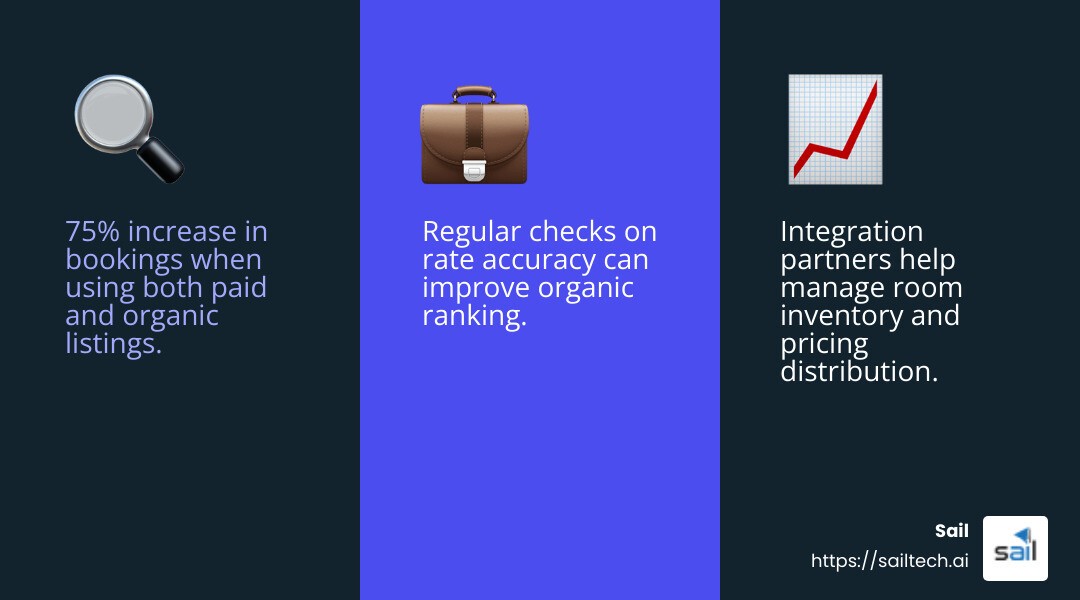Blogs /
Direct Bookings & Conversion
As travel demand evolves, hotel marketing is no longer just about visibility—it’s about being discovered where booking decisions are made. This report explores how search, social, and AI are reshaping guest acquisition.

Google Hotel Ads Organic is a game-changer for hotels looking to improve their visibility and direct bookings. By appearing in organic listings, hotels can benefit from increased exposure without incurring ad costs, making it a cost-effective way to attract more guests. Here's what you need to know about google hotel ads organic:
Cost Savings: No direct charge when users click on your organic listing.
Increased Visibility: Your hotel appears alongside paid listings on Google, offering more chances to capture direct bookings.
No OTA Commission: Organic listings help reduce reliance on Online Travel Agencies (OTAs), keeping more revenue in your pocket.
Easy Integration: Setting up an organic listing is straightforward with a Google Business Profile.
For hotel managers looking to cut marketing costs and drive direct bookings, google hotel ads organic stands as a vital tool.
I'm Shahar Rubin, and my background in AI-driven hotel marketing allows me to provide valuable insights into google hotel ads organic. This expertise helps hotels maximize direct bookings, reducing dependence on costly OTA platforms.
What are Google Hotel Ads?
Google Hotel Ads is a powerful tool for hotels to showcase their offerings on Google. Think of it as a meta-search engine specifically designed for hotels. It allows potential guests to compare hotel prices from various sources, including the hotel's own website and different Online Travel Agencies (OTAs).
How Does It Work?
When someone searches for hotels on Google, they see a list of options. These include both paid and organic listings. The listings show current prices, availability, and other details. This allows travelers to make informed decisions quickly.
Here's what happens step by step:
Search: A traveler types a search like "hotels in New York" into Google.
Display: Google Hotel Ads displays a list of hotels with prices from various sources.
Comparison: Users can compare these prices to find the best deal.
Booking: They can book directly through the hotel or through an OTA.
Benefits for Hotels
Direct Bookings: By appearing in these ads, hotels can encourage direct bookings. This means more revenue without paying a commission to OTAs.
Price Transparency: Guests see the same room listed on multiple platforms, making it easier for them to trust and choose your hotel.
Increased Reach: Google Hotel Ads help hotels reach a wider audience, including those who might not have found them through other channels.
Why Use Google Hotel Ads?
Most travelers start their hotel search online. Being visible on Google is crucial. With Google Hotel Ads, hotels can ensure they are seen by potential guests at the right time.
By leveraging these ads, hotels not only increase their visibility but also compete effectively with OTAs. This helps them capture more direct bookings and reduce reliance on third-party platforms.

Incorporating Google Hotel Ads into your strategy can lead to significant benefits. Whether you're a small boutique hotel or a large chain, these ads offer a way to reach more guests and increase direct bookings.
The Evolution of Google Hotel Ads
A Brief History of Google Hotel Ads
Google Hotel Ads began as a paid service. Hotels and Online Travel Agencies (OTAs) would bid for the top spots in search results. This allowed them to appear prominently when users searched for accommodations. Initially, these ads were a key tool for hotels to gain visibility and attract bookings by outbidding competitors.
Introduction of Organic Listings
In March 2021, Google introduced a game-changing feature: organic listings. This addition allowed hotels to appear in search results without paying for ad placement. Organic listings are displayed below the paid ads and offer a cost-effective way for hotels to gain visibility. This move was a strategic shift to improve user experience and provide more options for both travelers and hotels.
The introduction of organic listings was significant for several reasons:
Cost Savings: Hotels could now appear in search results without incurring costs, reducing their reliance on paid ads.
Increased Visibility: Organic listings provided additional exposure, helping hotels reach potential guests who might not have seen their paid ads.
Direct Bookings: By appearing in organic results, hotels had a better chance of capturing direct bookings, bypassing OTA commissions.
Enhancing User Experience
Google's addition of organic listings wasn't just about helping hotels save money; it was also about improving the user experience. When travelers search for hotels, they now see a broader range of options, including both paid and organic listings. This variety helps users make more informed decisions by comparing prices and availability across different platforms.
Moreover, the inclusion of organic listings aligns with Google's commitment to providing relevant and comprehensive search results. Users benefit from a more diverse selection, while hotels gain an opportunity to stand out without incurring additional costs.
The Impact
The impact of these changes has been profound. According to Google, some hotel chains have experienced a 75% increase in bookings by strategically leveraging both paid and organic listings. This dual approach allows hotels to maximize their presence on Google, capturing more bookings and enhancing their brand visibility.
By understanding and utilizing both paid and organic options, hotels can effectively steer the evolving landscape of Google Hotel Ads. This evolution underscores the importance of staying informed and adapting to new features that can drive success.
How to Get Your Hotel Listed Organically
Getting your hotel listed in Google Hotel Ads organic results is a powerful way to boost visibility without incurring costs. Here's how you can make it happen:
Listing Requirements
To appear in the organic section, your hotel must meet several key requirements:
Be Live on Google Hotel Ads: Your property must already be participating in Google Hotel Ads. This is a prerequisite for organic listings.
Accurate Hotel Matching: Ensure your hotel is correctly matched from your inventory to Google's system. This means your hotel's details should be up-to-date and accurate.
Rate Availability: You need to have a rate available for your property and itinerary. This ensures that when a potential guest clicks on your listing, they see the correct pricing.
Bid Setting: Even for organic listings, having a bid set for your property in Google Ads is necessary. This doesn't mean you have to pay for clicks, but it helps Google understand your participation level.
Setup Process
To get started, the setup process involves a few crucial steps:
Google Hotel Center Account: First, ensure you have an active account on the Google Hotel Center. This is where you'll manage your hotel's presence and see performance reports.
Integration Partners: Consider working with an integration partner. These partners help manage your room inventory and pricing distribution to Google. They can also assist in setting up and managing your Google Hotel Ad campaigns.
Rate and Availability Feed: Connect your rates and availability through an API or a third-party channel manager. This ensures that your listings are accurate and up-to-date, which is critical for both paid and organic success.
Why Integration Partners Matter
Integration partners simplify the process of getting your hotel listed. They handle the technical aspects of connecting your hotel’s inventory to Google. This includes ensuring data quality and compliance with Google's specifications. By using a partner, you can focus on managing your hotel rather than the intricacies of ad setup.
Keeping Your Listings Accurate
Accuracy is key for success in organic listings. Regularly check that your rates are competitive and correctly displayed. This can affect your organic ranking, as Google considers price accuracy in its sorting algorithm.
By following these steps, you can tap into the benefits of Google Hotel Ads organic listings. This approach not only saves costs but also improves your hotel's visibility and potential for direct bookings.

Benefits of Organic Listings in Google Hotel Ads
Organic listings in Google Hotel Ads offer a host of benefits that can significantly boost your hotel's online presence. Let's explore how these advantages translate into tangible gains for your business.
Cost-Effective Exposure
One of the most compelling benefits of Google Hotel Ads organic listings is that they are completely free. Unlike paid ads, where costs can add up quickly, organic listings allow your hotel to appear in search results without any financial commitment. This means more visibility without denting your marketing budget.
Increased Visibility
Organic listings provide an additional layer of exposure by allowing your hotel to appear twice in Google Hotel Ads: once in the paid section (if applicable) and once in the organic section. This double listing increases the chances of potential guests noticing your hotel, especially when they click "view more rates" to explore options.
No OTA Commission
When guests book directly through your hotel's organic listing, you sidestep the often hefty commission fees charged by Online Travel Agencies (OTAs). This can represent a significant saving, as OTAs typically take a 15%-25% cut from each booking. By reducing reliance on OTAs, your hotel retains a larger share of the booking revenue.
Direct Bookings
With organic listings, guests are directed straight to your hotel's booking engine. This seamless path encourages direct bookings, which can lead to a more personalized guest experience and higher customer satisfaction. Direct bookings also provide you with valuable customer data, which can be used for future marketing efforts.
Brand Prioritization
Organic listings allow your hotel's brand to stand out. When potential guests see your hotel listed organically, it can improve their perception of your brand as a trusted and popular choice. This is especially valuable in competitive markets where building brand recognition is crucial.
By leveraging Google Hotel Ads organic listings, your hotel can enjoy these benefits without the associated costs of paid advertising. This strategy not only improves visibility and direct bookings but also prioritizes your brand in the eyes of potential guests.
Organic vs. Paid Listings: Which is Better?
When it comes to Google Hotel Ads, the decision between organic and paid listings can significantly impact your hotel's online strategy. Both options have their own strengths, and understanding these can help you make an informed choice.
Visibility
Paid listings have a clear edge in terms of visibility. They appear in the top four slots of search results, which is where 88% of clicks happen according to research. Organic listings, on the other hand, are tucked away in the "view more rates" section, capturing only 11% of clicks. This means paid listings are more likely to be seen by potential guests.
Click-Through Rates (CTR)
Because of their prime position, paid listings enjoy higher click-through rates. If your goal is to drive as much traffic as possible to your hotel’s booking page, investing in paid listings might be the way to go. However, it's important to note that organic listings still contribute to one out of three bookings from that 11% click share, meaning they punch above their weight in terms of conversion.
Conversion Rates
The conversion rate for Google Hotel Ads is about 3.55%, as reported. Both organic and paid listings can contribute to this, but the higher visibility of paid ads often translates into more conversions. Yet, organic listings have the advantage of leading to direct bookings, bypassing OTAs and their fees.
Cost-Per-Click (CPC) vs. Cost-Per-Acquisition (CPA)
Paid listings operate on a cost-per-click (CPC) model, where you pay each time someone clicks on your ad. This can become costly, especially in competitive markets. Alternatively, the cost-per-acquisition (CPA) model, available for paid listings, charges only for actual bookings, potentially offering better value.
Conclusion
Choosing between organic and paid listings in Google Hotel Ads depends on your hotel's specific goals and budget. If visibility and traffic are your top priorities, paid listings may be worth the investment. However, for cost-effective exposure and direct bookings, organic listings can be a valuable part of your strategy.
Understanding these differences is key to optimizing your presence on Google Hotel Ads and maximizing your hotel's reach and revenue.
How to Optimize Your Organic Listings
Optimizing your Google Hotel Ads organic listings is crucial for maximizing visibility and attracting more direct bookings. Here's how you can make the most of this opportunity:
Profile Accuracy
First things first, ensure your hotel's profile is accurate. Double-check your hotel's name, address, and contact details. Inaccurate information can confuse potential guests and lead to lost bookings. Keep everything up to date to build trust and ensure seamless communication.
Rate Parity
Rate parity means offering the same room rates across all platforms, including your website and OTAs. When guests see consistent pricing, they're more likely to book directly with you. This not only helps maintain trust but also boosts your chances of securing direct bookings.
Content Management
Your content should be fresh and relevant. Regularly update your hotel's description, amenities, and photos. Highlight unique features and recent upgrades. Engaging content can entice potential guests and improve your overall appeal.
Guest Reviews
Encourage satisfied guests to leave reviews. Positive reviews can significantly impact a potential guest's decision to book. Respond to reviews, both positive and negative, to show that you value feedback and are committed to improving your services.
Strategic Bidding
Even though organic listings are free, having a strategic bidding approach for any paid campaigns can improve your overall visibility. Use automated rules to adjust bids based on conditions like occupancy rates or special events. This can help you appear in both organic and paid slots, maximizing your reach.
By focusing on these areas, you can improve your Google Hotel Ads organic listings, increase direct bookings, and improve your hotel's online presence.
Next, we'll answer some frequently asked questions about Google Hotel Ads organic.
Frequently Asked Questions about Google Hotel Ads Organic
Do Google Ads affect organic ranking?
Short answer: No, Google Ads do not directly affect organic ranking.
Google keeps its paid and organic listings separate. This means paying for ads does not boost your organic ranking. However, having a strong ad presence can increase brand visibility and drive more traffic, which might indirectly benefit organic performance. It's about being present in both spaces to maximize exposure.
How do I check organic traffic on Google Ads?
Tracking organic traffic: Use Google Analytics.
To see your Google Hotel Ads organic traffic, you need to set up Google Analytics. Once set up, go to the "Acquisition" section. From there, steer to "All Traffic" and then "Source/Medium." Look for entries like "google / organic" to track traffic coming from organic listings. This helps you understand how well your organic listings are performing and adjust strategies accordingly.
What is the difference between Google paid ads and organic?
Paid Ads vs. Organic Listings:
Paid Ads: These are the listings you see at the top of search results marked as "Ads." Hotels pay a cost-per-click (CPC) to appear here. They offer immediate visibility but come with a cost.
Organic Listings: These appear below the paid ads. They are free and based on the relevance and quality of the hotel's information. Organic listings are cost-effective and can drive direct bookings without commission fees.
Understanding these differences helps you decide how to balance your marketing strategy between paid and organic efforts. Each has its benefits, and using them together can improve your hotel's online presence.
Next, let's summarize what we've learned about Google Hotel Ads and how Sail's AI-driven solutions can help improve your visibility and direct bookings.
Conclusion
In the changing landscape of hotel marketing, Google Hotel Ads organic listings have emerged as a game-changer. They offer a cost-effective way for hotels to boost visibility and attract direct bookings without the burden of OTA commissions. By appearing in both paid and organic slots, hotels can maximize their online presence and reach more potential guests.
Sail's AI-driven marketing solutions are designed to harness the power of these organic listings. Our unique, risk-free model covers all ad spend, so you only pay for the bookings we generate. This approach ensures that your hotel gains increased visibility on essential platforms like Instagram, Metasearch, and Google, without any upfront costs or long-term commitments.
With Sail, integrating our technology with your existing hotel systems is seamless, allowing you to focus on what you do best—providing exceptional guest experiences. Our strategies not only improve your online presence but also drive significant increases in direct bookings, which are crucial for maintaining strong guest relationships and maximizing revenue.
Partnering with Sail means choosing a cost-effective, low-risk approach to hotel marketing. Our solutions are custom to help you steer the complexities of Google Hotel Ads organic listings and beyond, ensuring your hotel stands out in a crowded market.
Explore how Sail can transform your hotel's marketing strategy today.
Share:
20 years of hospitality lessons. No fluff. No spam
Join 500+ hospitality pros getting our best growth playbooks.
© 2026 Sail. All rights reserved.
